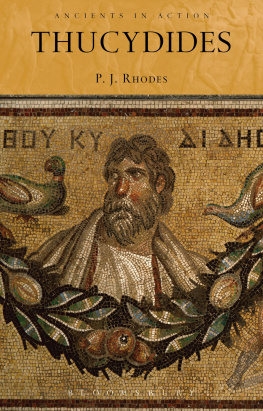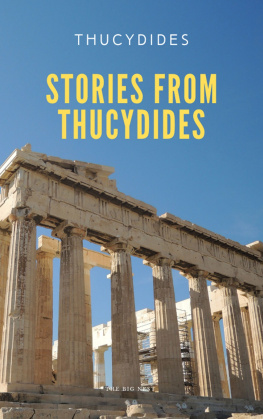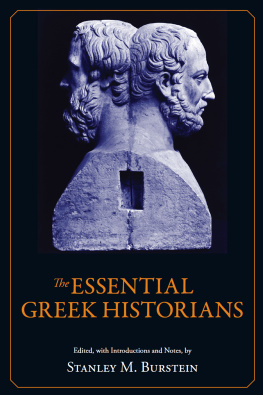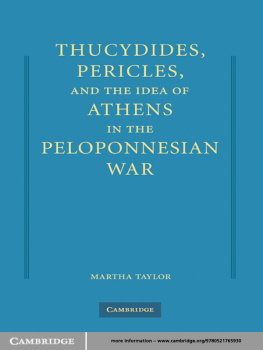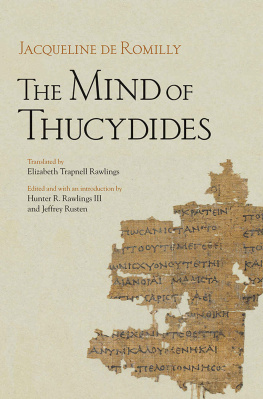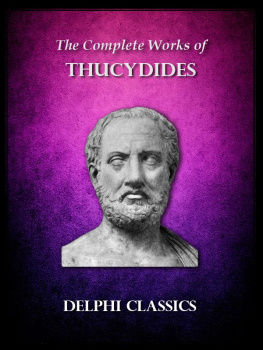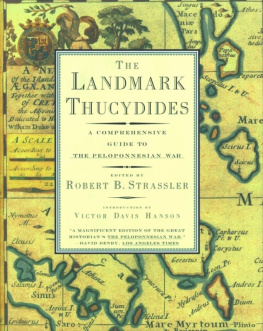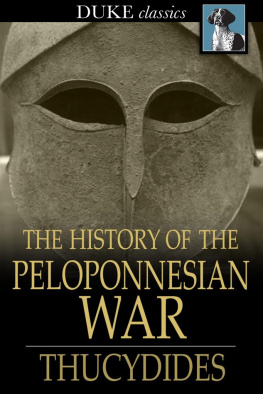Thucydides
Thucydides
P. J. Rhodes
Bloomsbury Academic
An imprint of Bloomsbury Publishing Plc
ANCIENTS IN ACTION
Boudicca
Marguerite Johnson
Catiline
Barbara Levick
Catullus
Amanda Hurley
Cleopatra
Susan Walker and Sally-Ann Ashton
Hadrian
James Morwood
Hannibal
Robert Garland
Horace
Philip D. Hills
Lucretius
John Godwin
Martial
Peter Howell
Ovid: Love Songs
Genevieve Lively
Ovid: Myth and Metamorphosis
Sarah Annes Brown
Pindar
Anne Pippin Burnett
Sappho
Marguerite Johnson
Spartacus
Theresa Urbainczyk
Tacitus
Rhiannon Ash
Contents
My thanks to Dr R. D. Rees and to the staff of Bloomsbury for inviting me to write this book and encouraging me as I worked on it. This series of books, Ancients in Action, introduces major figures of the ancient world to the modern general reader, including the essentials of each subjects life, works and significance for later western civilisation. I hope that my book will be found interesting and worthwhile by students as well as by the modern general reader, and will encourage readers of both kinds to read and enjoy Thucydides, and I end the book with a guide to further reading, but the publishers did not want and I have not set out to provide a textbook.
I have been involved with Thucydides for many years, and inevitably I say some things in this book which I have said previously elsewhere, in different ways and on different levels for different audiences. In particular I thank Oxbow Books (successors to Aris and Phillips) for permission to adapt material from my editions of books I, II, III and IV. 1V. 24, and Oxford University Press for permission to adapt material from my Introduction to and Notes on the Oxford Worlds Classics translation of Thucydides by M. Hammond. All translations are my own, apart from the quotations on p. 84.
References by numbers alone (e.g. I. 2. iiiiv) are to Thucydides. For other texts I use the following abbreviations:
Arist. Pol. | Aristotle, Politics |
Ath. Pol. | Athenaion Politeia (the Athenian Constitution written in Aristotles school) |
CIL | Corpus Inscriptionum Latinarum |
Diod. Sic. | Diodorus Siculus |
FGrH | F. Jacoby et al. (eds), Die Fragmente der griechischen Historiker |
Fornara | C. W. Fornara (ed.), Translated Documents of Greece and Rome , i. Archaic Times to the Peloponnesian War (Cambridge University Press, 1983) |
Hdt. | Herodotus |
ILS | Inscriptiones Latinae Selectae |
Lewis and Reinhold | N. Lewis and M. Reinhold, Roman Civilization (Columbia University Press, 1990). |
Lucian, Hist. Conscr. | Lucian, Quomodo Historia Conscribenda sit ( How History should be Written ) |
M&L | R. Meiggs and D. M. Lewis (eds), A Selection of Greek Historical Inscriptions to the End of the Fifth Century b.c. (Oxford University Press, 1968) |
Pl. Resp. | Plato, Respublica ( Republic ) |
Plin. H.N. | Pliny, Historia Naturalis |
Plut. Per. | Plutarch, Pericles |
PSI | Pubblicazioni della Societ Italiana per la Ricerca dei Papiri Greci e Latini in Egitto |
Sen. Controvers. | Seneca, Controversiae |
Smallwood, Docs. Gaius | E. M. Smallwood (ed.), Documents Illustrating the Principates of Gaius, Claudius and Nero (Cambridge University Press, 1967) |
Tac. Ann. | Tacitus, Annals |
Vell. Pat. | Velleius Paterculus |
[Xen.] | Xenophon [attributed to] |
( Dates in the form 478/7 are either Athenian official years, beginning in midsummer, or from 431 onwards Thucydidean years, beginning in spring )
499493 Ionian Revolt against Persia
Persian invasion of Greece (battle of Marathon)
480479 Persian invasion of Greece (battles of Thermopylae, Artemisium, Salamis, Plataea)
478/7 foundation of Delian League
c. 460 birth of Thucydides
c. 460446 First Peloponnesian War
440439 Athens war against Samos
435433 war between Corinth and Corcyra
Athens attack on Potidaea
Thebes attack on Plataea
beginning of Peloponnesian War
430427/6 plague in Athens
battles in Gulf of Corinth, aborted Spartan attack on Piraeus
428427 revolt of Mytilene against Athens
capitulation of Plataea to Sparta
427425 civil war in Corcyra
427424 Athens campaign in Sicily
Athens defeat in Aetolia
426/5 campaign in north-western Greece
Athens success at Pylos
Athens capture of Cythera
Athens unsuccessful attack on Megara
424/3 Athens defeat by Boeotians at Delium
424422 campaign to north-west of Aegean
one-year truce between Athens and Sparta
Peace of Nicias
Athens alliance with Argos and other Peloponnesians
Spartas victory over Athens and allies at Mantinea
Athens capture of Melos
religious scandals at Athens
415413 Athens major campaign in Sicily
Spartas occupation of Decelea
Spartas first alliance with Persia
oligarchic revolutions in Athens
411 autumn end of Thucydides narrative
Athens victory over Sparta at Cyzicus
Spartas victory over Athens at Notium
Athens victory over Sparta at Arginusae
Spartas victory over Athens at Aegospotami
Athens capitulation, end of Peloponnesian War
c. 400 death of Thucydides
Thucydides, the Athenian historian, lived from about 460 b.c. to a little after 404, and wrote a history of the Peloponnesian War, the war between Athens and Sparta, at the time the two most powerful states in Greece, which began in 431 and ended with Spartan victory in 404. Although there are a few allusions to the end of the war, he did not live to finish his history, but the narrative breaks off in the autumn of 411. The war was important, because, as Thucydides says, it was long drawn out (I. 23. i), and most of the Greek world, together with some non-Greek peoples, were caught up in it (I. 1. iii), though it did not finally settle the rivalry between Athens and Sparta, which continued into the fourth century. Thucydides history of the war is important, because he lived through it and was involved in it, and because his history has impressed readers as a work of exceptional thoroughness and intellectual calibre, and it has been admired ever since, both in antiquity and in more recent times.
In it he sought not only to establish what happened but also to explain how and why it happened, writing:
To the listener its lack of a fabulous element will perhaps make it less attractive; but if it is judged useful by those who want to examine a clear account of what happened, the like of which or similar things will in the course of human nature some time happen again, that will suffice.
Not lacking in confidence, he continued:
What I have written is a possession for all time rather than a competition piece for immediate hearing (I. 22. iv)

